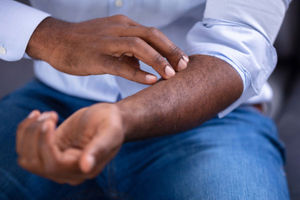
Individuals with psoriasis may experience social isolation. PHOTO | BEATRICE NAKIBUUKA
Patrick Tumwine Ndyanabo is a social worker at Life House Uganda. In 2014 while at university, he developed an itchy skin patch on his left arm that looked like a ringworm infection.
The patch grew bigger with time and when he went to a clinic, he was given a cream, which did not help. Since he was still a student with no disposable income, he tried to look for cheaper treatment options in clinics but the condition only worsened.
“Another patch developed on the line of my back. My legs were scaly, itchy and painful. Although I tried to conceal it with clothes, my self-esteem and social life were greatly affected,” he says.
A dermatologist at the university took a sample from his skin and after four days of tests, he said Ndyanabo’s skin cells were normal.
“Because it was so itchy, I would relentlessly scratch my legs in a futile attempt to control the pain. I vividly recall getting rid of all my shorts. I could not bear the walk of shame as people stared at me with repulsion. I resorted to wearing trousers and long-sleeved shirts. Sadly, a few months later, it progressed to both my thumbnails,” he adds.
Due to the resemblance in appearance, his condition was on many occasions mistaken for other skin conditions such as eczema, dandruff, contact dermatitis and ringworm but none of the remedies recommended provided any relief.
Turning point
Searching for a solution, Tumwine went to Kampala Skin Clinic and after examination, Dr Fred Kambugu, a dermatologist, diagnosed him with a skin condition called psoriasis.
Tumwine was given several ointments and creams that he had to apply to the patches. The doctor also recommended a review after two weeks. However, the medicines given still did not help.
“Although the creams did not work, I was glad I knew what was wrong. Because I had suffered from this skin condition for so long, I took it upon myself to study it extensively,” he adds.
From his extensive reading, he learnt that psoriasis can occur at any age, but typically begins between 15 and 30 years. Psoriasis has a significant emotional and social impact on those affected, with many experiencing stigma, low self-esteem, and anxiety.
Knowing the triggers
As he dived deeper into the search for a remedy, he read Dr John O.A Pagano’s book; “Healing Psoriasis The Natural Alternative.” After reading his book, he stopped the search for a remedy and switched to a plant-based or vegan diet.
“Within four months, my skin had cleared completely, my thumbnails grew back, my confidence was boosted and the once charismatic Patrick came back to life. I will however add that living a life on a fixed exclusion diet is not a walk in the park. It calls for persistent sacrifice, self-denial, and discipline.”
After some time, he started to crave the foods that he had cut out of his life; sugar, red meat, dairy, and wheat. He succumbed to the cravings, deviating from his diet.
“While scrolling through 2018 Valentine’s Day selfies, I caught a glimpse of a small patch emerging from my forehead hairline. It was then that I realised, with a sinking feeling, that psoriasis had made an unwelcome comeback. It is now six years, and I am still stuck in a cycle of trial and relapse with my diet, desperate to find relief from scalp psoriasis. Much as the results have been dishearteningly scarce, I have realised that the body will always communicate when something is not right,” he recalls.
Family support
Tumwine is grateful that during the dark moments when he was looking for a proper diagnosis, “my family stood by me with unwavering financial support, offered both spiritual guidance through prayer and invaluable psychosocial counsel, helping me navigate those difficult times with resilience and hope,” he remarks.
What is psoriasis?
Dr Abraham Mukalazi, a dermatologist at Mildmay Hospital, says psoriasis is a chronic skin condition characterised by the rapid growth of skin cells that leads to thick, scaly patches on the skin's surface. These patches, known as plaques, are often red, inflamed, and covered with silvery scales. Psoriasis can vary in severity from small patches to large areas covering significant portions of the body. Common symptoms include itching, burning and pain.
The exact cause of psoriasis is not fully understood, but it is thought to involve a combination of genetic and environmental factors. The immune system plays a central role, as it mistakenly attacks healthy skin cells, accelerating cell turnover.
“Psoriasis is an autoimmune condition that causes the skin cells of an affected area to grow approximately five to 10 times faster than normal. In people without psoriasis, skin cells typically take around 30 days to mature and shed. However, in people with this condition, this process is accelerated and skin cells can mature and shed in as little as four days. This rapid cell growth leads to a buildup of dead skin cells, causing the characteristic thick, scaly, and inflamed patches.”
Prevalence
According to the International Federation of Psoriasis Association (IFPA), approximately two to three percent of the global population has psoriasis. This translates to around 125-150 million people worldwide.
“The prevalence of psoriasis in Africa is less clearly defined, although research suggests that it might be lower compared to Western countries. Nevertheless, psoriasis is present and can be a serious health concern in various African countries. Specific prevalence figures for psoriasis in Uganda are not extensively documented,” he says.
Challenges in Uganda regarding psoriasis include limited access to specialised dermatological care, stigma associated with the condition and variations in local medical practices and treatments. Efforts to improve awareness and treatment access are crucial for addressing the needs of individuals living with psoriasis.
Misconceptions
Individuals with psoriasis may experience social isolation due to the visible nature of the skin lesions. People may avoid social situations or feel self-conscious about their appearance, leading to feelings of loneliness and depression.
There can be judgment and discrimination from others who do not understand the condition. People with psoriasis may face negative attitudes or assumptions about their cleanliness or health.
Psoriasis is often misunderstood, leading to several misconceptions and stigma, which can affect individuals with the condition both socially and emotionally. Here are some common misconceptions and the associated stigmas:
The common misconception is that psoriasis is contagious. However, Dr Mukalazi says this is an autoimmune condition, which results from the body's immune system attacking its skin cells. Therefore, psoriasis cannot be spread through touching an infected person.
“Psoriasis primarily affects the skin but is not just a skin condition because it can have broader implications. It is a systemic condition with potential impacts on overall health, including joint pain (psoriatic arthritis), cardiovascular health, and emotional well-being,” Dr Mukalazi adds.
Psoriasis is not caused by poor hygiene but is a chronic condition with genetic and immune system components. Maintaining good hygiene does not influence the onset or severity of psoriasis.
It is a misconception to think that psoriasis can be cured with simple treatments because there is currently no cure for psoriasis. There are, however, various treatments available to manage symptoms and improve quality of life. Treatments may include topical medications, phototherapy, systemic drugs, and lifestyle changes.



